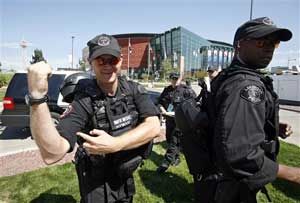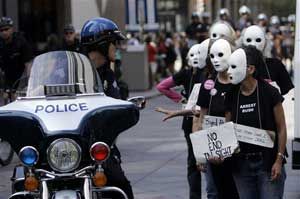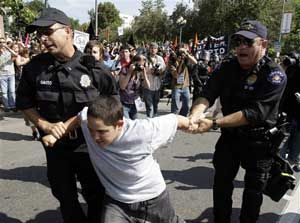By Christopher N. Osher
The Denver Post
 Officers from the Lakewood, Colo. police department joke around with the media as they prepare to guard the front entrance to the Pepsi Center, site of this week’s Democratic National Convention. (AP Photo) |
DENVER — Gerry Whitman has been chief of the Denver Police Department since 2000. He joined the force in 1982 as a patrol officer. He has repeatedly declined to discuss what equipment or tactics police might use during the convention, but he recently answered a few questions by e-mail from Denver Post staff writer Christopher N. Osher:
Q: What will be the Denver Police Department’s responsibilities during the Democratic National Convention?
A: To work with the United States Secret Service and other federal, state and local law enforcement to provide security to DNC venues and events throughout the metro area. We also will maintain our 24-hour patrol and investigative coverage throughout the city.
Q: Will this be the biggest event the Denver Police Department has faced?
A: As far as numbers of participants, the DNC is not the largest event we have participated in. However, in my career this is certainly the most complex event from a safety and security perspective.
Q: How much extra training have officers undergone to prepare for the event?
 Protesters speak to a police officer during a protest on Sunday. (AP Photo) |
A: Officers have participated in more than 110,000 hours of training related to the DNC.
Q: Should the public feel free to come downtown during the Democratic National Convention?
A: Our top priority is to keep Denver open for business and ensure the convention is a historic, memorable and safe event.
Q: Do you believe the Police Department is well-prepared for the event, and if so, why?
A: Yes, the department and the city have been participating in a multijurisdictional planning process for more than a year, supported by extensive training.
Q: Should protesters feel free to exercise their First Amendment right to free speech, and if so, why?
A: Yes.
 Protesters and police clash during a protest on Sunday as the city preparesd for the Democratic National Convention. (AP Photo) |
Q: What activity by protesters would be considered illegal and something they should refrain from doing?
A: See the brochure we sent you. (The brochure, prepared for distribution by the city’s Agency for Human Rights and Community Relations, offers advice on where protesters have a right to demonstrate. It also warns them they can be arrested if they refuse a lawful order to disperse, even if they aren’t breaking a law. Other grounds for arrest include blocking streets, sidewalks or parades, and disrupting public assemblies, regardless of whether the disruptions are the result of civil disobedience or symbolic actions, according to the brochure. It also states that people can protest or march on public sidewalks without a permit as long as they leave enough room for others to pass and obey traffic signals. Speech that angers other people is protected by the First Amendment, but speakers can be arrested for advocating violence or breaking the law, the brochure says.)
Q: How inconvenient was making last-minute arrangements for Invesco Field?
A: The change to Invesco was a challenge, but we feel we have a solid plan in place to make a safe and memorable event.
Q: What did you think when you learned Denver would host the convention?
A: When I heard we were bidding for the convention, I was confident we would be awarded the DNC. The additional work has been a great experience for the department and a benefit to the entire city.
Q: How has it been to work with other agencies, such as the Secret Service?
A: The department has always worked well with our federal, state and local partners. The fact that so many local police and sheriff’s departments volunteered to participate in providing security for the DNC is a testament to the fact that law enforcement in Colorado has a strong partnership.
Copyright 2008 The Denver Post

